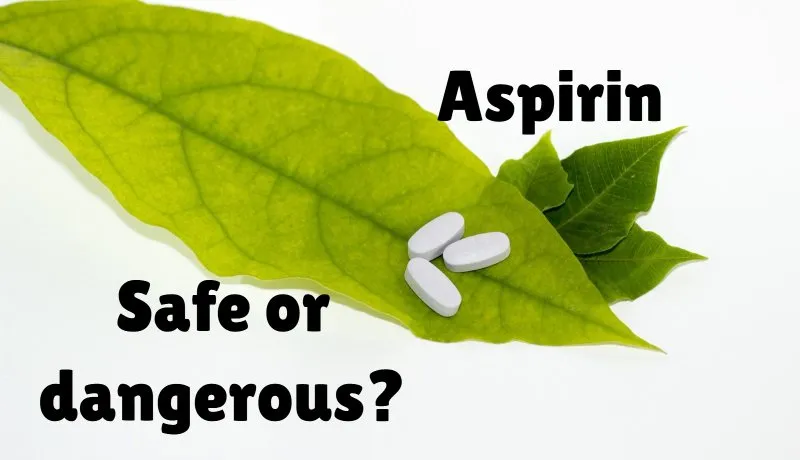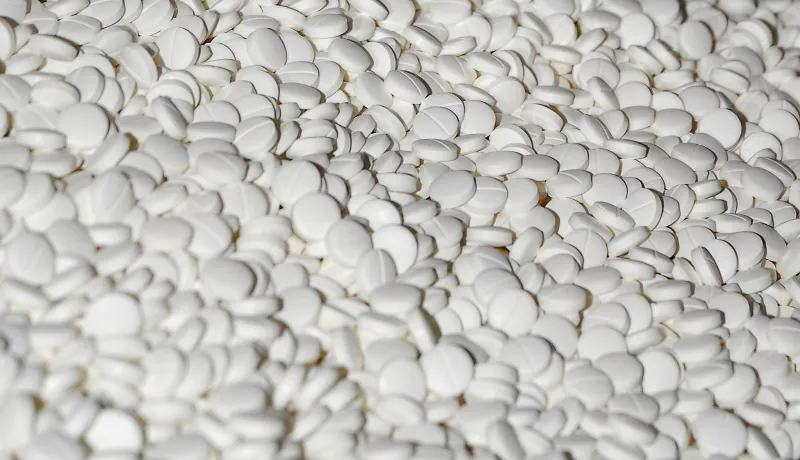Are there natural alternatives to aspirin?
Are they safe?
And do they actually WORK?
What does the research show?
That’s what you’ll discover in this post, the original version of which I wrote and posted long ago at my natural health blog. So there's no plagiarism here!

But what brings you here today?
Perhaps you (or people you care about) are taking AN ASPIRIN A DAY to reduce the risk of heart attack or stroke? You’ve been told that a daily aspirin will help prevent blood clots which, if they break loose and travel to the brain, can cause a devastating stroke.
Maybe you’ve heard that BABY ASPIRIN is safe because it’s a lower dose of the active ingredient? But you’re wanting to be really sure.
Or perhaps your healthcare professional has recommended you take COATED ASPIRIN? The outer layer is added so the tablet passes through your stomach before the enteric coating starts dissolving in your intestines. Safer that way, they say.
Well, if the people that MAKE the stuff are worried about what aspirin can do to your stomach lining, you've got every reason to be worried too.
Today, more than ever before, it's important to be aware of the risks associated with medications -- and your doctor might not tell you about them. So smart health consumers will check the facts for themselves. More and more people today are not willing to LET OTHERS DECIDE what goes into their body. More power to them, that's what I say.
And if that's you, CONGRATS.
But whatever it is that has brought you to this page, welcome!

We’re going to dig into the aspirin story and after we check out the published research, we’ll identify some natural alternatives to aspirin. Safer ones.
Gone are the days when we just accept what the local doctor tells us. Thanks to “the world’s biggest library” as some people call the internet, we now have access to a wealth of information. But often the good stuff is written in complex medical terminology… which puts this knowledge out of reach for many folks.
Not here. The goal here is to make the truth clear.
First, an important warning
Do not stop taking any pharmaceutical product without consulting a health professional. You could experience serious, even life threatening, consequences if you do. This article is for informational purposes only. Nothing here is intended as or should be substituted for medical advice. (You'll recognize this as the usual medical disclaimer.)
What is this drug called aspirin?
It’s an analgesic… a pain killer. Or as the government’s MedlinePlus site says, “Aspirin is a commonly used pain reducer and fever reducer.”
"Can increase the risk of bleeding"
The site goes on to say, “It is a nonsteroidal anti-inflammatory drug (NSAID) that can increase the risk of bleeding, including in the stomach and gastrointestinal (GI) tract.”
Comment: Here, and throughout the article, I’ve added emphasis to highlight important points.
Like a surprising number of pharmaceutical medicines, aspirin was first found in the plant kingdom. It came from the bark of the willow plant. The main active ingredient is called acetylsalicylic acid.
These days aspirin is big business.
HOW BIG?
Well, Bayer sold over $500 million dollars worth of their Aspirin Cardio in 2015. That's 524 million Euros.
And that’s just the Cardio version. You have to nearly DOUBLE that to get their total aspirin sales that year. It was reported as 997 Euros.
Then you can add the dozens of combination products, released under different brand names, that include aspirin with other ingredients.
That makes aspirin a BILLION DOLLAR product.
So what do you reckon? Do the corporate bosses want you to know the RISKS of consuming their billion dollar product?
Not likely, eh?
But it gets worse.
In the world of Big Pharma, aspirin is definitely not the only massively profitable product that is dangerous. More on that in future posts. Stay tuned.
What are the known risks of aspirin?
There are 47 major side effects of aspirin. And a handful of minor ones, including renal failure — and when your kidneys can no longer remove waste from your blood or control the level of fluid in your body, you can die!
As if that list from drugs.com isn’t worrying enough, the site also says: “You should check with your doctor immediately if any of these side effects occur when taking aspirin.”
"May not be effective... and may double the risk"
According to the government health research site PubMed:
- “Long-term low-dose aspirin therapy may not be effective in preventing cardiovascular disease and may double the risk of gastrointestinal bleeding.”
Source: PubMed
Look at more of these astonishing statements from PubMed.
“In a population-based cohort, aspirin use was significantly associated with an increased risk of major gastrointestinal or cerebral bleeding episodes.”
Source: PubMed“A strong positive association between regular aspirin use and CD.”
Source: PubMed
Comment: CD is Crohn’s Disease which is a chronic inflammatory bowel disease.“use of aspirin, NSAIDs and calcium channel blocker, increased the risk of bleeding.”
Source: PubMed“Patients with a bleeding peptic ulcer after NSAID/LD ASA consumption frequently have H. pylori infection.”
Source: PubMed
Comment: ASA is acetylsalicylic acid, the active ingredient in aspirin.“As compared with placebo or aspirin, OAC with or without aspirin does not reduce mortality or reinfarction, reduces stroke, but is associated with significantly more major bleeding.”
Source: PubMed
Comment: OAC is oral anticoagulation. An infarction is a heart attack, so a reinfarction is having another heart attack.“Aspirin increases mortality in diabetic patients without cardiovascular disease.”
Source: PubMed“Aspirin adversely effects cerebral blood flow in vivo. […] This result may help explain the possible increase in ischemic stroke seen in low risk patients on aspirin therapy.”
Source: PubMed
But what about low dose aspirin and baby aspirin?
“The risks of aspirin therapy may outweigh the benefits for primary prevention of cardiovascular disease.”
Source: PubMed“Short-term administration of low-dose aspirin is associated with small bowel injuries and blood flow.”
Source: PubMed“Aspirin causes significant gastroduodenal damage even at the low doses used for cardiovascular protection.”
Source: PubMed“Low-dose aspirin has been linked to gastroduodenal ulcer.”
Source: PubMed
"ZERO clinical support"
In an article entitled A Baby Aspirin A Day Is A BAD Prescription For Most, Dr. Michael Murray cites the European Heart Journal which tells us that taking 50–100 mg/day “has ZERO clinical support“.
That’s bad news (for the aspirin industry).

Now it’s time for some GOOD NEWS (for you)
And yes, there are safe, natural alternatives to aspirin.
But before you do…
Before you start replacing your aspirin (or any pharmaceutical drug) with a natural alternative, you should consult with a competent healthcare professional BECAUSE natural therapies can interact adversely with medications you may be taking. Better safe than sorry.
(1) Turmeric (curcumin) is a natural alternative to aspirin
First, a few facts about turmeric (also known as Indian saffron). It’s a yellow-orange spice that’s related to the ginger plant. You probably know it as a major ingredient in curry powder, giving curry its strong color. The main active ingredient is curcumin.
What are the side effects of turmeric?
"Demonstrated to be safe"
“Curcumin has been demonstrated to be safe in six human trials and has demonstrated anti-inflammatory activity.” In other words, generally regarded as safe. With no serious side effects. Source: PubMed.
However, if you take turmeric or curcumin in large doses as supplements, you may (a few people do!) experience minor side effects. Things like mild digestive issues (bloating, acid reflux, flatulence, diarrhea), headache and nausea, and skin rash. Source: AuthorityNutrition.
Compare that to the benefits such as a lower heart attack risk, improved antioxidant status, better blood vessel function and lower inflammation. Sounds like no contest to me.
And there are also OTHER benefits from curcumin:
“New science confirms eating turmeric every day reverses cancer.” Source: NaturalNews
(2) Pycnogenol is another natural alternative to aspirin
Pycnogenol is an extract from French maritime pine bark. It prevents blood clotting at least as effectively as aspirin but at a lower dose (which is a good thing). It’s natural and it’s safer, as made clear in the PubMed quote below. What’s not to love about that, eh?
As a bark extract, pycnogenol is about 65-75 percent proanthocyanidins (procyanidins), a class of polyphenols found in a wide variety of plants, many of which have been in the human diet since the earliest days. Such as green tea, black tea, cranberry, bilberry, cocoa beans, cinnamon, and black currant.
But is pycnogenol safe?
"Very good safety profile... without side effects"
"Pycnogenol® has a very good safety profile" says a report in PubMed that compares aspirin and pycnogenol. "Pycnogenol® seems to reduce the recurrence of RVT [retinal vein thrombosis] without side effects. It does not induce new hemorrhagic episodes that may be theoretically linked to the use of Aspirin®."
(3) And that's not all.
Depending on why you’re taking aspirin, Dr Axe offers several other alternatives: ginger, MSM, bromelain (from pineapples) and Wobenzym N.
And on that happy note, I wish you...

As always, talk to your healthcare professional about any health concerns this post has raised. And when you do, you’ll be equipped with valuable information because you've read this post. THANK YOU FOR YOUR INTEREST TODAY.
You've just read my 2nd Steemit post. Here's a link to my 1st post:

